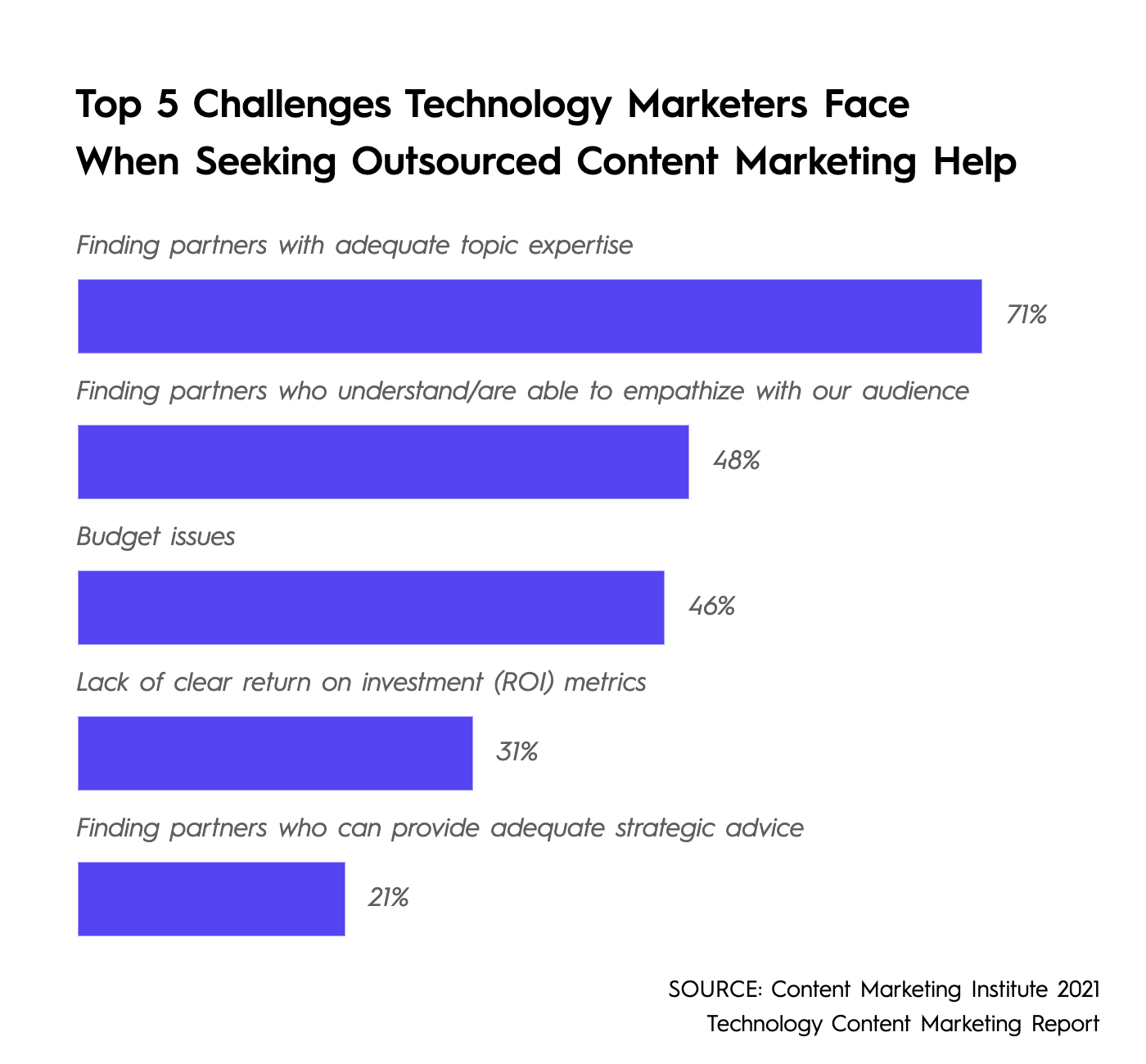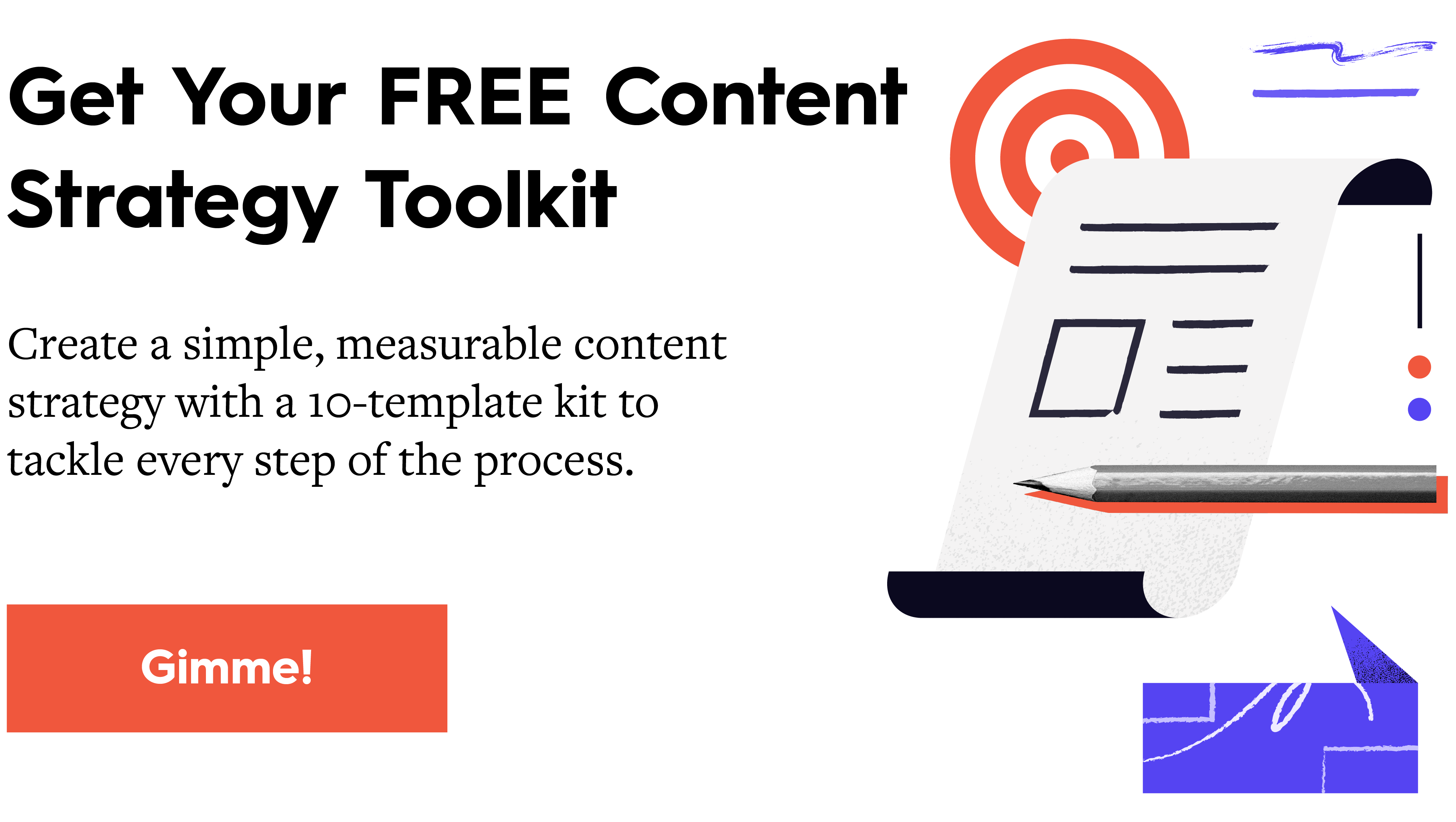Tech marketing isn’t easy, especially in the wake of a global pandemic. Content marketing does make it easier for brands to connect with the right people. However, marketing teams are often small or limited in how much content they can create in-house. Therefore, according to the Content Marketing Institute’s 2021 Technology Content Marketing Report, 57% of tech marketers outsource content. But outsourcing comes with its own challenges.

Each of these challenges is unique, and we know about all of them firsthand. Luckily, we also know how to overcome them. If you’ve been struggling to find the perfect partner to outsource your tech marketing to, life is about to get easier.

Top 5 Barriers to Outsourcing Tech Marketing
From topic experts to budgets, here are the biggest hurdles to finding good marketing help, along with our best tips to navigate them.
CHALLENGE 1: Finding Partners With Adequate Topic Expertise
Unfortunately, tech content marketing is often quite niche. Finding writers, speakers, and general content creators who can speak authoritatively on your particular technology or industry can be a huge problem. (This is especially true in tech, where writers are not usually tech engineers, and tech engineers rarely moonlight as writers.)
The fix: If you need experts, there are two ways to approach it.
- Look for a content marketing agency that specializes in your industry. Even if they haven’t worked in your particular industry, agencies have a notable network of writers, partners, and creatives with a wide variety of specialties. Whether you need someone to craft a whitepaper for the semiconductor industry or need someone to script an explainer video about your latest product innovation, an agency can often find them for you.
- Pair your experts with their copywriter. Even if a writer is not an expert themselves, they are an expert in communication. They can distill complex ideas, identify the most compelling story to tell, and even find stories you may not have expected. If you have the experts in-house (e.g., a lead engineer or head of product development), let an agency copywriter interview them for articles or other content inspiration. Blending an expert’s knowledge and a writer’s storytelling skills ensures the content you generate will be authoritative and credible. Plus, these types of pairings often end up generating even more interesting story ideas.
If you’re not sure what to look for (or ask) a potential agency, follow our tips to find and vet the right partner.
CHALLENGE 2: Finding Partners Who Can Empathize with Your Audience
You know your brand better than anyone, which is why it can be challenging to work with an outside team. However, their outside perspective is also one of the biggest benefits. An agency can spot gaps in your content, identify messaging opportunities, and come up with fresh ideas. Of course, they can only provide those expert recommendations if they have a true understanding of what your audience needs and wants.
The fix: Craft strong marketing personas that help your agency identify exactly who your audience is, what their pain points/needs are, and how your product addresses them. (We often find that brands have personas that are outdated or incomplete.) If you haven’t clearly identified your audience, see our step-by-step guide to build personas. (It comes with a free template too.) This is the key document any agency will need to find compelling stories for your audience.
CHALLENGE 3: Budget Issues
There’s nothing more frustrating than going over budget—for both the client and the agency. There are all sorts of reasons this can happen. Maybe the agency was unclear about how many revision rounds are allowed. Maybe a major brand stakeholder was left out of the review process and now wants to make major revisions at a late stage. Maybe the creative execution just isn’t working—for both parties.
There are all sorts of small and big things that can add to the bill. When this happens, we find it is often due to poor communication at some level, whether it’s between the brand and agency, the brand and the brand, or the agency and the agency.
Remember: Communication is the foundation of every good relationship.
The fix: Clear communication is everything. Whether you’re working on a specific project or trying to get the most value from the content you create, make sure you and your agency are talking about:
- Expectations
- Timeline
- Feasibility
- Process
Everything should be upfront and transparent. (If it’s not, you’re definitely NOT working with the right partner.) For more tips on fostering good communication, find out how to create a good working relationship with your agency.
Of course, more budget always helps. If you’re looking for more funds, here are 5 ways to ask for them.
CHALLENGE 4: Lack of Clear ROI
This is one of the most common issues for marketers, whether they’re working with an internal or external team. (We’ve faced the same challenges too.) It’s also especially challenging when you’re trying to justify more budget (see #3).
The fix: We don’t move forward with a project unless we have defined clear success metrics. This ensures everyone is clear about the goal of the project and stays on the same page throughout the process, from brainstorming to distribution.
If you’re not sure how to measure that, see our guide to choose the right metrics for your content strategy.
CHALLENGE 5: Finding Partners Who Can Provide Adequate Strategic Advice
Tech marketing can only be successful if it’s grounded in a strategy. Shockingly, the CMI report found that only 41% of respondents said they have a documented content strategy. (Please hold while we have a heart attack over that stat.)
While a content strategy is unique to each brand, the elements are the same for all. You need clear goals, an understanding of your audience, etc. A good agency should be able to understand your brand’s vision and guide you through these elements to craft an effective strategy with you.
The fix: When you’re looking for an agency, look for demonstrated results. They should have case studies to show, a strategic framework to share, and a data-based approach to marketing. That said, your brand can make it easier for your agency if you have the main elements of a content strategy established already. See our content strategy toolkit to find out what you need.
How to Improve Your Tech Marketing
Whether you’re working with an outside partner or retooling your marketing strategy with your own team, focus on creating content that tells your brand story and serves your audience’s needs. If you’re looking for more tips…
- Deliver a cohesive message. Use our free brand messaging template to make sure you’re telling the right stories.
- Tailor your content to your buyer journey. Use our buyer journey template to help you say the right thing at the right time.
- Focus on value. Here are 10 tips to make content that converts.
And, of course, if you’re looking for more expert help, we’re here for you. If you want to know what it’s like to work with us on a content strategy, see our FAQs or hit us up directly. We’d be happy to chat.






My startup expansion plans are definitely on the cards. Job delegation is part of the plan too. I have been considering outsourcing tech marketing jobs especially SEO marketing, as the work could get overwhelming as we scale our startup.
Now that you’ve outline the challenges and the solutions, I could use it as a guide/blueprint for my future outsourcing plans. Your step-by-step user persona is also useful. Thanks for the comprehensive guide!
That’s awesome. Best of luck!